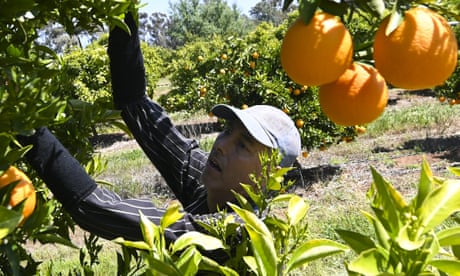- by foxnews
- 08 Apr 2025
Australian farm revolution: hopes and fears as a new workforce replaces backpackers
Australian farm revolution: hopes and fears as a new workforce replaces backpackers
- by theguardian
- 24 Apr 2022
- in news

The changes threaten to fuel exploitation and create a sub-class of workers on Australian farms, advocates have warned, as the workforce fills with Pacific Islanders and migrants from south-east Asia.
Since the borders reopened, 18,500 people with working holiday visas have arrived in Australia, according to the latest figures from the Department of Home Affairs, and 7,009 have applied for visa fee refunds (a further 33,371 on student visas have also applied).
Figures from the National Farmers Federation suggest only 7,000 backpackers had returned to work in agriculture by February, compared with a pre-pandemic workforce of about 40,000.
And growers are worried that even as backpacker numbers increase, many of them will choose jobs in other industries.
That is now much easier thanks to changes to the working holiday visa designed to help other industries with labour shortages, and changes to the rules for UK travellers under the free trade agreement with Australia.
British backpackers, who have typically made up about 25% of the horticultural workforce, are no longer required to work in regional Australia for 88 days to be able to renew their visas.
Backpackers from other countries still have to complete the 88 days requirement, but in July 2021 the government expanded the eligible categories of work, allowing them to also work in the tourism and hospitality sectors in northern Australia, to fill gaps in the labour market.
Previously they could only work in farming, fishing, mining and construction, or on bushfire recovery projects.
Abul Rizvi, an immigration adviser says backpackers will avoid farm work if they have other options.
The farmers federation estimates that the horticulture industry is currently short of 10,000 workers.
And the Pacific islanders may soon be joined by another new cohort after the government created a special agriculture visa to lure workers from south-east Asia.
On 28 March Vietnam became the first country to sign on to the visa, which was first rolled out in October.
The Palm program has already been plagued with stories of exploitation. The human rights law firm Levitt Robinson says many workers are losing two-thirds of their pay because of unfair deductions from the labour-hire companies they are attached to.
And the chief executive of the Migrant Workers Centre, Matt Kunkle, says the south-east Asian visa fails to protect the rights of those taking it up.
One worker in his mid-30s Guardian Australia spoke with was recently working on a farm in Victoria under the Palm scheme. He said he and 60 other seasonal workers were told they would be paid $25.41 an hour, but when they arrived they were put on piece rates.
On the first day, the farmers offered $7 for a tray of strawberries, but that went down to $4.20 the next day and $3 the day after. The workers were only able to make $300 for working up to 73 hours in a week, he says.
Piece rates will no longer be allowed from 28 April after the Fair Work Commission ruled fruit pickers must be paid a minimum wage, while Levitt Robinson is currently building a class action over the Palm program.
Solicitor Dana Levitt says workers often failed to make enough money to send home thanks to unfair deductions.
- by foxnews
- descember 09, 2016
Ancient settlement reveals remains of 1,800-year-old dog, baffling experts: 'Preserved quite well'
Archaeologists have recently unearthed the remarkably well-preserved remains of a dog from ancient Rome, shedding light on the widespread practice of ritual sacrifice in antiquity.
read more


